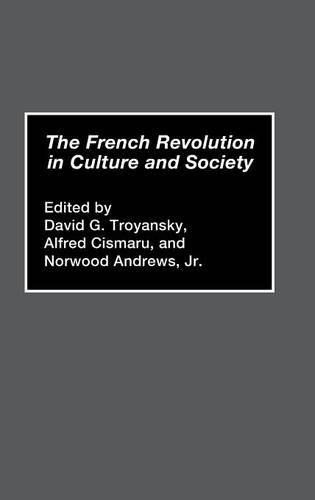
The French Revolution in Culture and Society
(Hardback)
Publishing Details
The French Revolution in Culture and Society
By (Author) Norwood Andrews
By (author) Alfred Cismaru
By (author) David G. Troyansky
Bloomsbury Publishing PLC
Praeger Publishers Inc
30th May 1991
United States
Classifications
Tertiary Education
Non Fiction
European history
Revolutionary groups and movements
Revolutions, uprisings, rebellions
944.04
Physical Properties
Hardback
240
Description
This volume examines the issue of the timing of cultural change, problems of Revolutionary anticipations and reverberations, and the relationship between culture, politics, and society. Individual essays combine both old and new approaches, ranging from textual analysis to the study of local judicial records, from the psychohistorical to the demographic. But they all demonstrate the usefulness of linking social and cultural history, broadly conceived, and of interdisciplinary approaches to the study of events. The creation of French Revolutionary culture is addressed. The contributors describe the physical act of dismantling and redefining the culture of the Ancien Regime for revolutionary purposes, new conceptions of time, and generation relations in Revolutionary rhetoric and law. The second part identifies key cultural ingredients from the distant past. It reminds us of the extent to which the Revolution employed the huge storehouse of Western culture to create something original. Three essays see the Revolutionary era as engendering psychological dislocation and social historians reveal the variety of approaches they have taken in trying to understand 18th-century France. The varied contributions exploit the sources that have become the stock-in-trade of modern social history. Poverty, crime, and population are among the leading topics in current historiography, but military and political institutions are also examined in new ways.
Reviews
Consisting of 15 papers originally presented at a 1988 symposium, this collection exhibits the diversity and richness of current research by a representative group of American (and a few French) scholars. Arranged around the theme of politics, culture, and society, the essays reflect a variety of political, literary, institutional, psychohistorical, and demographic approaches. The collection is broadly focused on the Revolution and explores problems in the Ancient Regime (e.g., the army's budget, criminal procedure) as well as the Revolution's impact (e.g., contraception). Many contributions deal with the debate over the extent of revolutionary change. Selected topics include destruction of royal monuments, the revolutionary calendar, Shakespeare in France, classical imagery. Diderot and Sade's treatment of sexual victims, poor relief, and ritualized violence against chateaus, as well as editor Troyansky's erudite essay on generational themes in political discourse. Several essays have appeared in earlier versions, others represent ongoing research. A 16-page bibliography of works cited is appended. Recommended for upper-division undergraduates and above.-Choice
"Consisting of 15 papers originally presented at a 1988 symposium, this collection exhibits the diversity and richness of current research by a representative group of American (and a few French) scholars. Arranged around the theme of politics, culture, and society, the essays reflect a variety of political, literary, institutional, psychohistorical, and demographic approaches. The collection is broadly focused on the Revolution and explores problems in the Ancient Regime (e.g., the army's budget, criminal procedure) as well as the Revolution's impact (e.g., contraception). Many contributions deal with the debate over the extent of revolutionary change. Selected topics include destruction of royal monuments, the revolutionary calendar, Shakespeare in France, classical imagery. Diderot and Sade's treatment of sexual victims, poor relief, and ritualized violence against chateaus, as well as editor Troyansky's erudite essay on generational themes in political discourse. Several essays have appeared in earlier versions, others represent ongoing research. A 16-page bibliography of works cited is appended. Recommended for upper-division undergraduates and above."-Choice
Author Bio
DAVID G. TROYANSKY is an Associate Professor of history at Texas Tech University. He is author of Old Age in the Old Regime: Image and Experience in Eighteenth-Century France and contributed several sections to Historical Dictionary of the Third French Republic (Greenwood Press, 1986). He is presently working on future books about generations in French history and culture in revolutionary Alsace. ALFRED CISMARU is a Professor of Romance languages at Texas Tech University. He is currently writing articles on Ionesco and Beckett, and a book on Shakespeare's presence in French twentieth-century theatre. NORWOOD ANDREWS, JR. is a Professor of Romance languages at Texas Tech University. Specializing in Portuguese, Brazilian, and comparative literature, he is now working on a forthcoming book entitled Camoes among American Authors, A Preliminary Directory.
